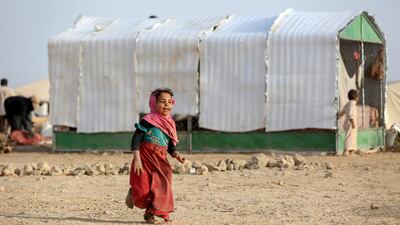Britain remains committed to humanitarian assistance in Yemen despite reducing aid to the country by up to 60 per cent, the UK’s Minister for the Middle East said on Tuesday.
Speaking at a parliamentary committee on Yemen, James Cleverly described the humanitarian situation there as “heartbreaking”, but said the coronavirus crisis had necessitated a reduction in aid.
Last year, Finance Minister Rishi Sunak was widely criticised after slashing Britain's foreign aid budget from 0.7 per cent to 0.5 per cent of gross domestic product to shore up the UK's finances.
Mr Cleverly was responding to claims by charities working in Yemen that cuts would fuel food insecurity and malnutrition among children and families.
The committee heard that more than 10 million people are at risk of famine in Yemen, a figure that has increased by 1.5 million in recent months.
Asked to justify the extent of the cuts, Mr Cleverly told the committee that his government would focus on averting the threat of famine and bringing the six-year civil war to an end.
He said humanitarian and diplomatic efforts went “hand in hand”.
“As I say, the economic situation has been forced upon us by coronavirus and we have to respond to that. We make difficult decisions about how we allocate our diplomatic effort as well as our own money every single year,” he said.
“It’s a difficult balancing act, but we have maintained a significant commitment to Yemen. It remains one of our largest commitments, and the UK remains one of the largest bilateral donors to the crisis.”
Charity bosses told the committee that a reduction in funding has already had an impact on their programmes, which provide vital cash assistance to struggling families displaced by the conflict.
Gillian Moyes, deputy Yemen director at the charity Save the Children, said her organisation had to withdraw funding from at least 41 health centres last year and a further 13 this year, resulting in a drop of over 27 per cent of vulnerable people being reached.
“The fear of famine, the risk of famine is significant. So we are focused very much on maintaining food distribution, and that does mean making sure that our humanitarian money goes towards feeding people,” Mr Cleverly said.
“This year has been particularly difficult. No one is trying to downplay how difficult these decisions are.
“Ultimately, one of the most important things that we can do to help the people of Yemen is to bring the conflict to a conclusion, and to use our diplomatic efforts.”
The UN has described Yemen as the world’s worst humanitarian crisis and said famine could become part of “reality” in 2021.
At a pledging conference last month, the UN sought to raise $3.85 billion from more than 100 governments and donors to address that crisis, but only $1.7bn was offered.
Save the Children’s chief executive Inger Ashing decried the lack of funds raised for Yemen, calling it a country “at a tipping point”.
“We have warned donors over and over again. Their inaction is leading to death,” she said.
“That thousands of children will be dying of hunger and disease in 2021 is a political choice.”


